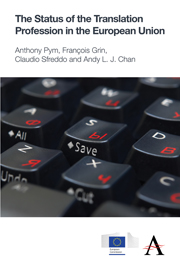Book contents
- Frontmatter
- Contents
- GENERAL INTRODUCTION
- 1 METHODOLOGICAL ISSUES
- 2 RESULTS
- 3 CASE STUDIES
- 4 SOCIOLOGICAL MODELLING
- 5 ECONOMIC MODELLING
- 6 POLICY OPTIONS FOR ENHANCED SIGNALLING
- 7 RECOMMENDATIONS
- APPENDIX A Translator Associations: Years of Foundation and Numbers of Members
- APPENDIX B Why There Are About 333,000 Professional Translators and Interpreters in the World
- APPENDIX C Online Translator—Client Contact Services: New Modes of Signalling Status
- APPENDIX D Types and Use of Economic Perspectives on Translation
- APPENDIX E Equilibrium on the Translation Market
- NOTES
- REFERENCES
- ACKNOWLEDGEMENTS
- NOTES ON THE RESEARCH TEAM
2 - RESULTS
Published online by Cambridge University Press: 05 April 2014
- Frontmatter
- Contents
- GENERAL INTRODUCTION
- 1 METHODOLOGICAL ISSUES
- 2 RESULTS
- 3 CASE STUDIES
- 4 SOCIOLOGICAL MODELLING
- 5 ECONOMIC MODELLING
- 6 POLICY OPTIONS FOR ENHANCED SIGNALLING
- 7 RECOMMENDATIONS
- APPENDIX A Translator Associations: Years of Foundation and Numbers of Members
- APPENDIX B Why There Are About 333,000 Professional Translators and Interpreters in the World
- APPENDIX C Online Translator—Client Contact Services: New Modes of Signalling Status
- APPENDIX D Types and Use of Economic Perspectives on Translation
- APPENDIX E Equilibrium on the Translation Market
- NOTES
- REFERENCES
- ACKNOWLEDGEMENTS
- NOTES ON THE RESEARCH TEAM
Summary
Here we summarise the results corresponding to the following questions: 1) the status of translators in the various census, taxation and job-description systems. 2) the relative status of academic qualifications and training, 3) the status of sworn or authorised translators, and 4) the role of professional associations.
These results are followed by a series of case studies, where the four questions are answered in terms of more or less unified national signalling systems.
What is the Status of Translators in Official Categorisations?
General classifications of economic activities
In the “Statistical Classification of Economic Activities in the European Community” (NACE) we find “Translation and Interpretation” listed as a separate category (74.3), alongside “Specialised design activities”, “Photographic activities” and “Other professional, scientific and technical activities”. This classification is picked up in some of the national listings (in Croatia, Poland, Portugal and the United Kingdom, for example) and in principle should apply throughout the European Union.
The International Labour Organization has an International Standard Classification of Occupations (ISCO-88) in which translators and interpreters are categorised in major group 2 “professionals”, sub-major group 24 “other professionals”, minor group 244 “social science and related professionals” and unit group 2444 “philologists, translators and interpreters”. This classification has been reported as being used in Austria.
- Type
- Chapter
- Information
- Publisher: Anthem PressPrint publication year: 2013



